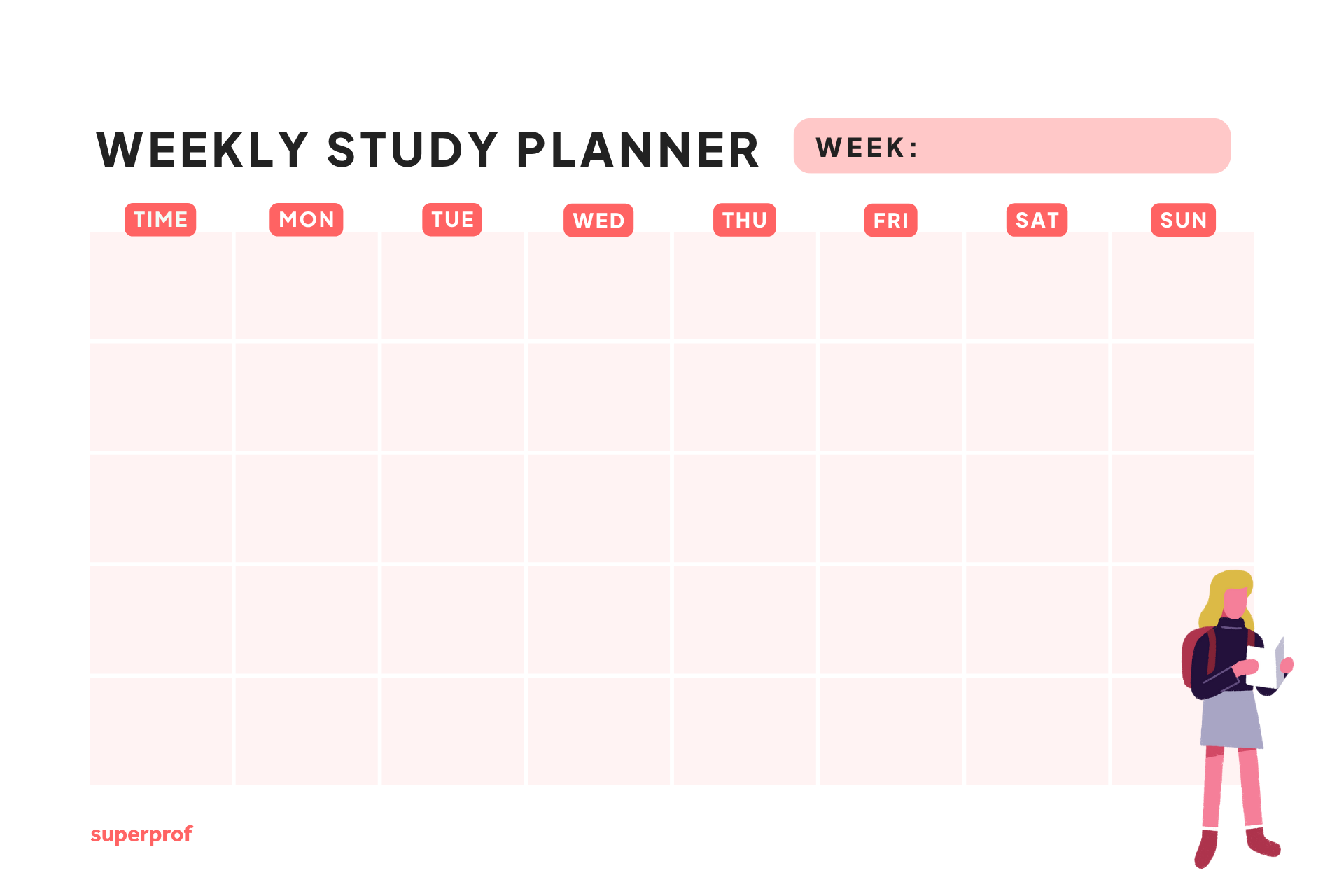By building a realistic, structured study planner that balances your time, targets your academic weaknesses, and keeps you consistent, you'll give yourself the best chance of doing well in any exam. A well-designed study plan breaks down goals into manageable tasks, keeps you on top of different subjects, and stops you from burning out!

Start with a Study Plan Template
Before taking any action, create a plan. A structured template should help you break your goals into manageable tasks and visualise your week.
Download our free study plan to get started.

Track subjects, time slots, and even your breaks. A study plan is a broader overview of your learning strategy. There isn't any magic solution to creating a study plan, and you don't need to reinvent the wheel. Instead, focus on manageable scheduling, regular breaks, and studying little and often rather than trying to cram once or twice a week.
Why You Need a Study Plan Before Exam Season
While the start of term feels like ages away from exams, you'll quickly find exam season sneaks up on you. With the pressure of school, homework, extracurricular activities, and just everyday life, all your time can quickly disappear.
A Stanford study found that students who applied a more strategic approach, such as early, organised study using available resources, improved their exam scores by 3–5 percentage points, approximately one-third of a letter grade
If you don't have a clear study plan, you can fall behind, lose focus, and even start struggling in subjects that you were once comfortable in.
By planning ahead, you can structure your academic effort, giving you more time to prepare, less stress, and better results.
A study planner timetable does more than schedule when you study. It gives you a chance to take control of how, when, and what you learn. You'll find yourself being more productive, motivated, and disciplined.
Rather than cramming everything in the final weeks before exams, a solid plan will keep you on track over the weeks and months leading up to exam season.
compared to cramming.
The Value of Starting Your Revision Early
Starting revision early is essential. The earlier you begin, the more flexible you can be with your schedule and the less pressure you'll feel once the exams roll around.

Leaving everything to the last minute may seem manageable at first, but you'll typically be panicked, tired, and forgetful, which will cost you in exams.
By starting early, you have the opportunity to identify which subjects and topics require more time. This allows you to take time out to try different study techniques, revise past papers, and even adjust your study planner to what works for you.
Early revision can help you reduce anxiety. If you know you've done a lot of work, you'll be more confident and less stressed.
more study time. That's nearly 2 full school days of focused preparation without changing your schedule.
How to Build an Effective Daily and Weekly Study Routine
A good study routine is balanced. You have to juggle school hours, extracurriculars, and your own motivation.
A daily and weekly plan can help you maximise your time. Start by seeing when you're free each day outside of school and what time is taken up by meals, family time, and other activities. From there, break your timetable down into study blocks.
Your daily routine should focus on short, focused sessions. Between 30 and 60 minutes is great, and remember to take short breaks in between. You can stay more focused and less fatigued with regular breaks.

A simple calendar or study planner template can be used to map out your week. From there, prioritise more challenging subjects earlier in the day when you have more energy, and be sure to spread out easier topics or review sessions for later.
Your weekly schedule should rotate your subjects. With six subjects, for example, you can focus on two a day, take a day off, rest, and reset. This way, you'll cover everything and won't be overwhelmed.
There are apps and resources (like MyStudyLife, Notion, or a basic printed planner to help you stay on track with your tasks, assignments, and revision goals. Consistency is key, and intelligent planning will enable you to cover more material and stress less, leaving you time for your life, friends, and hobbies.

Prioritising Subjects: Where to Focus Your Time
While a lot of your subjects may carry the same weighting, the amount of time you should dedicate to each shouldn't be the same.
Instead, adjust your study planner to prioritise subjects according to your strengths and weaknesses to maximise your efforts.
List all your exam subjects and rate them on two criteria: confidence and the amount of content to cover. The subjects where you struggle or have a lot to study should get more time in your study planner timetable. For example, if you're good at maths but nervous about science, it might be worth allocating more time to science in your weekly plan.
This is easier said than done, so reviewing past papers can give you a better idea of how strong you are in each subject. This will help you adjust your study planner template and integrate more effective study techniques.
Don't ignore subjects you enjoy or excel in, though. Just review them less often than the ones you struggle with.
- Clear daily/weekly goals
- Specific subject focus
- Built-in review time
- Flexibility to shift when life gets busy
Creating Your Personalised Study Planner Timetable
You can design your own study planner timetable, which puts you in control of your time and your learning. This can help make exam prep clear with actionable steps.
Whether you prefer a digital app or a printed dairy-style planner, ensure you have a flexible yet focused timetable tailored to your life and study needs.
The first step is to block out your fixed commitments, such as school hours, meals, commute, sleep, and any other essential daily routines. From there, you can view your remaining open slots, which you can convert into dedicated study blocks.

These study blocks should be varied with a longer block (about an hour) and a shorter review session each day. Include breaks and rest days.
Use a study planner template with sections for subjects, topics, goals, and checkboxes to track your progress. It's great if you use it consistently throughout the month to stay organised and motivated.
Looking for ideas? Here's a nice example of a planner.
Customise your study planner template. You can use colours for different subjects, set reminders if you're using an app like MyStudyLife, and make sure you always include space for adjustments.
With a paper planner, dedicate a page each week to review your schedule and an extra page for detailed daily plans.
If something in your timetable isn't working, remember that you can change it. After all, the best study planners are the ones that fit with your schedule and help you to study effectively.
Text: Don’t overcomplicate your planner. A single sheet with weekly time blocks and checkboxes is often enough to get started. Focus on just two study goals per day at first, then scale up once the habit is in place.
How Much Time Should You Actually Spend Studying?
How long you spend studying is a precarious balancing act, and it's not the same for each student.
If you spend too little time studying, there's a risk of falling behind or underachieving in exams. However, if you study too much or attempt to cram too much into sessions, you run the risk of burning out.
The best news for students is that you don't need to spend all day studying. You need to study effectively.
Most students will find that 2 or 3 hours a day outside of school is enough for revision. On the weekends or holidays, you can extend that to 4 or 5 hours with regular breaks. The important thing is how you use the hours, not how many of them you schedule.
Short, structured sessions are typically more effective than long study marathons. Try techniques like the Pomodoro technique, where you focus for 25 minutes and then take a 5-minute break. Integrate this approach into your study planner and break subjects into manageable, focused chunks.
Ensure your weekly schedule reflects subject priorities as well. Focus on the subjects that you're less confident in and leave room to balance sessions with time to review, learn new things, and rest, especially with sleep being key to effective revision.
Studies show that people who write down their goals are around 42% more likely to stick to them, so tracking your revision in a planner, app, or simple list can similarly boost your consistency when studying.
Staying Consistent and Avoiding Burnout
Consistency is key to effective study. The best study planner will be useless if you don't stick to it.
Make your study routine sustainable and avoid burnout. If you overwork without breaks or make your study plan too rigid, you run the risk of giving up. Three hours every day without breaks means you'll get a lot of studying done, but if you only do it for one week and nothing the next, it's a waste.

Vary your study methods to keep things interesting and more sustainable. Use flashcards one day, past papers another, and summarise notes and review at the end of the week.
Reward yourself by integrating small incentives into your study plan. Associating study with progress and positive outcomes, you'll find yourself sticking to the plan.
Get Help from a Private Tutor
Another way to better structure your studying is with the help of a private tutor. Whether it's for a specific subject or for study skills in general, it can be helpful to have someone helping you.
On Superprof, simply search for the subject you need help with, and you can start browsing tutors' profiles to see their rates, services offered, and location.
With many offering the first session for free, you can try a few out before choosing the one that works for you and your study planner.
Summarise with AI:













